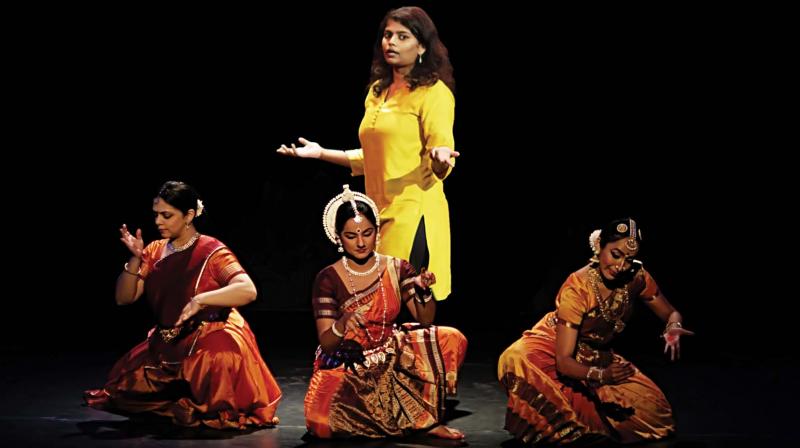The masks of God: In pursuit of Krishna
Meghna Das began her Odissi training at the age of four and grew up steeped in the richness of Indian mythology.

“Draupadi said,--’Why, O Pratikamin, dost thou say so? What prince is there who playeth staking his wife? The king was certainly intoxicated with dice. Else, could he not find any other object to stake?’ Yudhishthira, the eldest of the Pandavas, stakes his wife in a drunken game of dice. It’s a powerful tale, to be sure, but what keeps it alive? Perhaps every woman who hears the story of Draupadi, finds her own myth within it... “There was an assault on her and nobody helped,” says Meghna Das, the director of Anamika, a collaboration of theatre and three classical dances. Three separate vignettes, one each in Bharatnatyam, Odissi and Kathak, tied together by the narrator, ‘Anamika’, make up the show.
Conceptualised in 2015 and 15 shows later, Meghna and the cast of Anamika have often had audience members walk up to them afterwards, to tell their own stories. After watching Devaki’s sorrow upon giving up her child, Krishna, an audience member came up to cast after the show. “She had just sent her son off to college and misses him so much that it’s physically painful. she felt Devaki’s pain in watching her give away her son,” says Meghna. There have been college girls who giggle about sneaking out of their homes to meet the new boyfriend and empathise with Radha’s passions. “I had a non-Muslim lady tell me once... I don’t know your Radha, but through you I felt her pain.”
Meghna Das began her Odissi training at the age of four and grew up steeped in the richness of Indian mythology. “Odissi is my medium, it’s a form of storytelling I have practiced and studied for my entire life. And that included the performance of so many of these myths,” she says. But where do myths stand in contemporary times? Why do of Draupadi’s humiliation and Radha’s heartbreak still rankle? Why should these stories even be told? “I think a lot of artists question the relevance of their art forms, especially when the form is a traditional practice. They carry with them a weight of history and cultures so ancient that they predate almost anything that we do and say and think today.”
The answers she sought came to be in Anamika. “I found myself thinking, Radha’s heartbreak touches someone in the audience because heartbreak is heartbreak,” says Meghna. “Human emotion is a universal thing that binds us together, even if the myth of religion or the specific poetry is unfamiliar.” The ancient appears inaccessible, too cryptic to understand, but this couldn’t be further from the truth. “Anamika is a way of showing that the ancient is simply inaccessible but never irrelevant. It tries to find both - accessibility and relevance.”
Anamika, the narrator, is played by Lekha Naidu. “As her name suggests, she is the nameless woman, every woman, who bridges the gap between the female experience of this time with our oft-remembered mythological characters,” Lekha says.
Preethi Bharadwaj, a Bharatnatyam dancer, plays Krishna’s biological mother, Devaki. “In the Kulasekhara Azhwar Paasuram that I dance to, Yashoda’s joyful reality becomes Devaki’s sorrow. Devaki laments losing the supreme joy of motherhood.” Devaki imagines tearfully, the infant Krishna playing with his toys, or kicking his feet in his cradle.
Kathak dancer Pooja Pant performs the story of Draupadi. “She was humiliated and let down by all who were meant to protect her,” she says. And then there’s the story of Radha, who waits all night, alive with desire, for her lover, Krishna, who arrives at dawn, clearly after an encounter with another woman.
All the three female titans of Indian mythology are bound by a common thread. Krishna. His is the ultimate myth, the symbol of love, desire, despair and life itself. The eternal longing for something to love, the pain of losing what we love and a place in which to put our faith.
What: Anamika - A Search for Krishna
When: Aug. 17, 3 pm and 5.30 pm
Where: The Courtyard, Shanti Nagar

